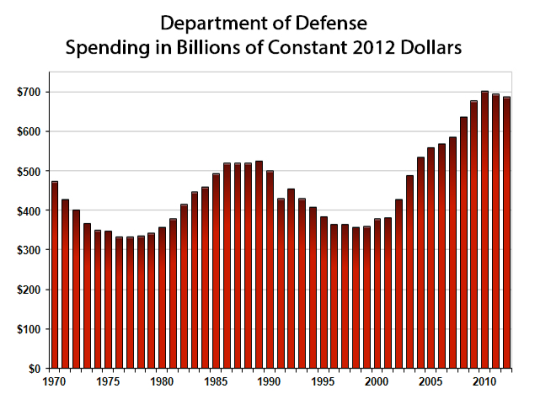Ever since the Cold War ended, the Pentagon has been pushing to become more “flexible” and “agile,” to use two words frequently heard at Defense Department briefings and found burrowed into innumerable Pentagon reports.
So how come the building is so flummoxed by a looming budget cut of 10%?
It’s a strange thing, this sequester – especially the Pentagon’s over-reaction. Sure, entitlement spending is driving the budget crisis. But that doesn’t mean military spending should be bullet-proof.
Yet instead of smartly saluting and doing what it has been told, the U.S. military has been wailing for more than a year about how the impending cuts – amounting to more than $500 billion over the coming decade – will cripple U.S. national security.
Looking like nothing so much as the Bolshoi Ballet, the choreographed screams about coming cuts has gone too far, even for hawks like conservative columnist George Will. In Sunday’s Washington Post, Will protested the Navy’s recent delay in dispatching the aircraft carrier USS Harry S. Truman to the Persian Gulf, purportedly due to the looming budget shortfall:
The Navy is saying it cannot find cuts to programs or deployments less essential than the Truman deployment. The Navy’s participation in the political campaign to pressure Congress into unraveling the sequester is crude, obvious and shameful, and it should earn the Navy’s budget especially skeptical scrutiny by Congress. The Defense Department’s civilian employment has grown 17 percent since 2002. In 2012, defense spending on civilian personnel than in 2002. And the Truman must stay in Norfolk? This is, strictly speaking, unbelievable.
[Battleland modestly believes Will gleaned these facts from our post last month linking him to a Government Accountability Office report containing them — Whatever Floats Your Bloat, By George! – but is pleased, nonetheless, to share such interesting tidbits far and wide.]
Here’s something to keep in mind: the Department of Defense budget, strictly speaking, isn’t elastic. It doesn’t expand and shrink on a moment’s notice. According to the rulebook, wars and other major operations are not funded in its budget. Its annual spending plan is designed to maintain the readiness of the U.S. military by training and outfitting it for combat.
When war happens, as has occurred several times since 9/11, the bulk of that cost is funded through so-called “supplementals,” which are chunks of extra money added to the so-called “base budget.” In typical Pentagon fashion, the Defense Department started referring to these supplementals as “Overseas Contingency Operations,” or OCOs, which muddies the water and confuses folks trying to keep track of military spending, but it’s basically the same bonus pot of money.
The bottom line is simple: in the decade after 9/11, the Pentagon pocketed more than $1 trillion in such budget add-ons. Truth be told, much of that money went to buy weapons unrelated to the wars. The military became intoxicated by easy money, and — like many drunks — doesn’t want to give it up.
Weaning the building off this geyser of cash, combined with $487 billion in cuts already made in Pentagon spending plans for the coming decade (that didn’t represent a cut, but merely a slower rate of growth than what the Defense Department said it needed), as well as the looming cuts slated to take place if the sequester kicks in on Friday, is what has Pentagon bean-counters up in arms.
The notion that the nation can’t trim its military spending back to 2007 levels – which is what the sequester would do – is bizarre. That level is higher than the Cold War average.
The martial sturm und drang it has engendered is a poor reflection on the military’s so-called leadership. The willing participation by uniformed budgeteers has turned them from warriors into just another special interest pleading their case.
As you hear the continued teeth-gnashing from the Pentagon this week, remember that such sounds aren’t because the U.S. military’s future may be so bleak, but because its recent past has been so gluttonous.



